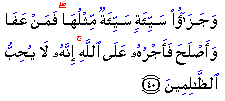Shariah, Nose in the dust, Haya
Issue 279 » June 18, 2004 - Rabi-al-Thani 30, 1425
General
| Living the Quran |
Al-Shura
(Counsel)
While Islamic Shariah (law) is under fire in the media and among 'academics' for inflicting 'cruel punishments', it is important not to lose sight of some noble principles set by the Quran that regulate the punishment and reform of criminals in the society. The images of flogging and beheading, often taken out of context and exaggerated, have greatly enhanced misconceptions surrounding the Islamic justice system. Shariah & Protection of Human Rights Since Islam places immense emphasis on fulfilling social obligations, it only punishes those crimes that violate the human rights. One of the golden principles of penal law in Islam is the right of Retribution (Qisas). When a person causes physical harm to a fellow human being, Islam gives the injured party the right of equal requital. This procedure is persistently labelled by critics as primitive and uncivilized. In the Islamic view of history, however, what is primitive has never been necessarily uncivilized, because human nature, inclinations, and divine guidance have always remained the same. Retribution: Its Purpose Khurram Murad in his book Shariah: The Way of Justice explains: In the eyes of the Quran, the right of retribution belongs to individuals, and not to society or state; this simple shift in responsibility results in a profound change in the whole system of implementing justice. Instead of starting an irreversible process of trial and punishment (involving so much time, financial support, and efforts for years), Islamic law initially leaves the ground open for settlement between individuals, without the interference by impersonal bureaucratic machinery, though under no circumstance can the individual take the law into his or her own hands. Two Conditions: 1- If the victim/injured chooses to demand compensation, it has to be equal to the loss incurred, and could never be more. This concept is quite contrary to our own judicial system in the West, where millions of dollars are often claimed by the victim in law suites for relatively small injuries or injustices. 2- Islamic law prefers that victim forgives the criminal. Thus under Qisas, punishment is avoidable, because "whoever forgives and amends, his reward is due from Allah..." The ideal way is not to seek vengeance at all, but reconciliation and make offender realize the gravity of his or her offence. It is also important to note, as Abdur-Rahman Doi in Shariah: The Islamic Law points out, the Quran generally adopts the same word for the punishment (retribution) as for the original crime. Thus in the above quoted verse, both the crime and punishment are called Sayyiah (evil); in chapter 2:194, the word used is I'tida (aggression). The use of the same word for both crime and punishment indicates that punishment itself, though justified by the circumstances, is truly speaking nothing but a necessary evil. |
| Understanding the Prophet's Life |
May
his nose be rubbed in dust! "May his nose be rubbed in dust! May his nose be rubbed in dust!
May his nose be rubbed in dust!" So I asked, "Who, O Messenger
of Allah?" He said : "Who has
parents with him, while they are old, whether one of them or both of them,
then does not enter the Paradise (though serving them and obeying them.)"
|
| Cool Bits! |
Haya in Muslim World Ask anyone in the Muslim world, whether Muslim or not, he or she will know what Haya is. There is no exact English word which can convey the whole meaning of the Arabic term Haya. Most people translate it as modesty, shamefulness, and shyness. But all these words have negative connotations that Haya does not have. Haya, unlike shyness and bashfulness, does not indicate that a person lacks self-confidence. In fact, in Islamic history, the person most noted for Haya was the third Khalifa Othman, may God be pleased with him. A person with Haya is not a shameless person. He or she is chaste, innocent, moral, restrained, upright, and virtuous. He or she is not immodest, immoral, indecent, lewd, unabashed, unashamed, unblushing, and unchaste. No, we are not talking about angels here. A Muslim goes up and down in his or her faith and practice, but the ideals of Haya are such. Prophet Muhammad, peace and blessings be upon him, said that every way of life has its distinct character and for Islam it is Haya (Muwatta). He also said Haya is the fruit of faith. (Bukhari, Muslim). Source: |
